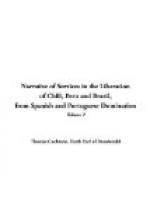Shortly previous to this, the Cortes at Lisbon—aware of what was going on in Brazil, and disregarding the temperate views of the King—issued a declaration inviting the Brazilian municipalities to repudiate the Regent’s authority at Rio de Janeiro, and to adhere to the immediate administration of the Cortes alone—thus indicating a course to be pursued by the Portuguese faction in Brazil. The result was—as had been anticipated—disunion amongst the people, consequent on the formation of petty provincial governments; each refusing to pay revenue to the central Government at Rio de Janeiro, for the alleged reason that the Regent was only waiting an opportunity to invest himself with absolute power. This opinion was eagerly adopted by the commercial class—consisting almost exclusively of native Portuguese—in the hope that the Cortes would reinvest them with their ancient trade privileges and monopolies, to the exclusion of foreigners, whom they considered as interlopers—the English especially, who, protected by a treaty of commerce, were fast undermining the former monopolists. Amidst these difficulties Don Pedro, though nominally Regent of Brazil, found himself, in reality, little more than Governor of Rio de Janeiro.
In July 1821, the Lisbon Cortes passed a decree, that thenceforth the Brazilian and Portuguese armies should form one body; the object being to ship the Brazilian troops to Portugal, and to send Portuguese troops to Brazil, thereby ensuring its subjection. The Regent was, moreover, ordered to return to Portugal.
These rash steps greatly irritated the native Brazilians, who saw in them a subversion of all their hopes of nationality. With scarcely less rashness, they issued proclamations declaring Brazil independent, with Don Pedro as Emperor; but he repudiated the act, and prepared to quit Brazil in obedience to orders.
The approaching departure of the Regent caused a general ferment, when a popular leader arose in the person of Jose Bonifacio de Andrada e Silva, vice-president of the provisional Junta at San Paulo. Summoning his colleagues at midnight, they signed an address to the Regent—to the effect that his departure would be the signal for a declaration of independence—daring the Cortes at Lisbon to promulgate laws for the dismemberment of Brazil into insignificant provinces, possessing no common centre of union; above all, daring them to dispossess Don Pedro of the authority of Regent conferred by his august father. This address was conveyed to the Prince by Bonifacio himself, and was shortly afterwards followed by others of a similar nature from the Southern provinces, and from the municipality of Rio de Janeiro—all begging him to remain and avert the consequences of the late decrees of the Cortes. On more deliberate reflection Don Pedro consented, and was shortly afterwards invested with the title of “Perpetual Protector and Defender of Brazil.”




